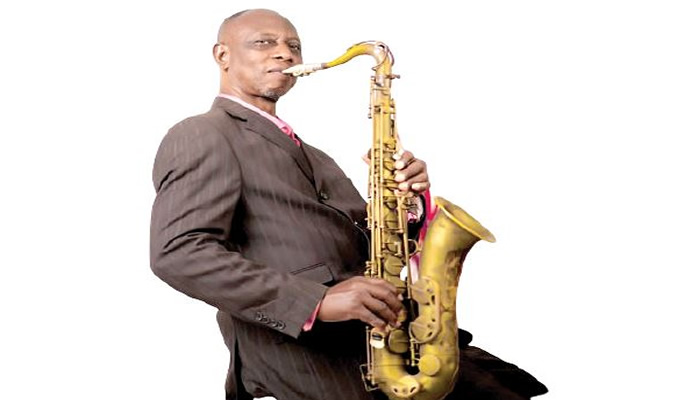
Veteran jazz musician and saxophonist, Herbert Ajayi, talks to EMMANUEL OJO about his journey in the music industry and why he stuck to jazz despite its limited popularity in Nigeria, among other issues
You’ve been in the music industry for some decades. How would you describe the experience?
It has not been a bed of roses but it has been interesting. It’s just like someone getting married. Marriage is not a bed of roses but it’s still very interesting. Sometimes when things don’t go well in the music industry, you begin to wonder what the problem is. Not everyone makes it in the music industry once they get into it. That’s why I said it’s not a bed of roses.
What has kept you going?
It’s my passion for it. I studied Music and it has been my passion for it. Many of my coursemates back in school have changed career paths. Some chose nursing and went to the United States of America, and changed their outlook completely. Some went into other businesses, some into teaching. I majored in performance. My project in school was performance and as such, it means I have to be on stage and that’s where I’ve been too, either in the church or elsewhere. It’s the performance for me. Even though I have some other aspects of music going on, I still have fulfilment at the performance thing.
How much of your fond childhood memories can you recall?
I don’t know too much about my childhood other than when I clocked 10. At 10, my family and I moved to a particular area in Surulere, Lagos, where I had friends who owned guitars and were doing music and that was what sent me into music. My cousin was living with us then. We both built a guitar because we didn’t have one like our neighbours and friends did. So we built one ourselves. We used the black thread women used for plaiting their hair. That was what we used as strings. When we saw that it wasn’t good enough, we built another one and then eventually we bought a guitar five or six years later. I had already started playing the guitar fairly alright then but before then, I wasn’t playing any music at all. The guitar was my first instrument.
My fondest childhood memory is about building the guitar. My cousin and I built two guitars. The first one wasn’t good enough, we built another one and we used stronger strings until we eventually bought our own. That’s something I can never forget. It stayed in my memory all these years.
How open were your parents to music?
My parents were not strict. My dad passed on when I was very young, like six years old. My mother took up the role and brought me up eventually and she made sure that music did not do too much to hinder my education but I was still given free hand to play music.
What impact did your dad’s demise have on the family’s finances?
We were three children and my mother was able to cope but of course, you know that when it’s just one parent, it won’t be that easy. Yes, there were some difficulties but we managed through until I graduated. In fact, at the time I graduated, I was already on my own, though I still went back home. I was at home until I completed my National Youth Service Corps programme in Lagos and came back to Ibadan.
Are you the eldest of the three?
I’m the second.
What schools did you attend?
I started at a public primary school in Surulere, Lagos. Later, I attended Mayflower School which belongs to Tai Solarin in Ikenne. I got there halfway through primary school. I left primary school and went to a secondary school and then left in Class Three. I completed secondary education in Lagos. Thereafter, I started a programme in interior decorations at Nigerian Ports Authority in Apapa dockyard. It was while doing that that I applied for Music at The Polytechnic Ibadan. I was among the first set of Music students. We enjoyed all the facilities there until the quality of Music education dropped. We had foreign lecturers and we enjoyed having them.
Did you receive any formal education in Music before you attended the polytechnic?
Well, while I was at Mayflower, I took my guitar to school and I won awards at that time. My colleagues and I competed with other schools and we won awards for the school. By the time I came back to continue my secondary education in Lagos, we formed a band, though I was still in secondary school, we formed a band and continued until I graduated and went into interior decoration. However, my mother saw that I was serious about Music. When she saw the publication of the polytechnic for admission, she encouraged me to apply and within six weeks of my application, I was at the polytechnic as a student. It was my mum who gave me the publication for music, then I applied and I got it.
When did you venture into music as a full-time business?
I graduated in 1983. I went for my youth service and finished in 1984. I came back and joined a jazz band in Broking House; that’s Johnson’s Broking House in Ibadan. I was there every Friday and it was on for about two years and some months after which I got into some other things and the advent of Christianity came into my life. In 1987, I joined a church in Lagos and went to Ibadan again. I joined another church and I was there till 1993. Eventually, when I got married, I did not stop playing music all along. Since I studied Music, I was always on the music team in the church, so, at one time I was being paid. Although it was low pay, other programmes outside kept me going and when I got back, I didn’t even bother about it.
What is your wife’s profession?
My wife also studied Music and we had a band. We got quite some programmes here and there in Lagos, Ibadan, Abeokuta, Ife, and so on. We kept moving around and eventually, we started a music school. We are running a music school in Ibadan and parents bring their kids to learn how to play one musical instrument or the other and then we have what is called summer music training. During the long vacation, we have some people that come and then learn for four weeks like they are going to school every day – Mondays to Fridays. At the end of the programme, we have a concert, a showcase concert for them to showcase what they have learned during the period. During the term too, some private students come. So, all year round, we have people patronising the school.
Why did you choose the saxophone as your major instrument, despite beginning with the guitar?
I picked up the saxophone before I finished studying Music because I discovered that it’s more internationally recognised, though the clarinet was there before saxophone came on the scene and I played the guitar and bass guitar too. I started with a saxophone my friend lent me. In the music school which I’m running, I teach saxophone, I teach bass guitar, I teach guitar. The only instrument I don’t teach is the piano. I leave it for others to do for me because I can’t teach all of it alone. During the summer, I rarely teach anything because there are many students and I bring in other instructors to help out.
Apart from music, what other aspects of life do you have an interest in?
I have not had other aspects other than music. I was basically doing church music and performing in different locations. From 2008, we started a music school, so, that took an aspect while the performance has also been ongoing.
My passion has kept me going. When I was much younger in music while I was in Lagos, I probably could have joined Fela’s band or played with a juju band or something. Each time I heard jazz music when I was young, I got glued to it and it triggered some things in me. I discovered that Fela’s music, juju music, and all that, didn’t appeal to me. I understand other music styles too but jazz music seems to be the ultimate. I found it to be the ultimate. It is very dynamic with different patterns of movement. I didn’t like the monotonous musical style. This is my God-given passion and that is what has kept me going. Even when things were not too rosy, the passion for jazz music kept me going. As Christians first of all, we are worshippers but when the chips are down, the passion keeps us going. I had my 69th birthday last year and it was jazz music I did.
Knowing that jazz music is a Western culture, do you find it profitable in Nigeria?
It’s not that profitable compared to popular music like ‘tungba,’ fuji, and the like that are making a lot of money. Jazz music is only for the discerning and educated mind and you don’t get so many people in that light in Nigeria but when you eventually get your proper connections through, you’ll be able to make a good living out of it. In the meantime, just continue to do what you are doing, you’ll get by somehow. I know definitely that you don’t get to hear jazz music everywhere like you hear the other popular stuff but those who love jazz music go where we play it and they are not in the majority.
Have you at any point thought of changing your style of music on the grounds of the fan base?
No, it’s a passion. Some guys have advised me to get into popular music and all that. I will try to do something to appease the general public but I will still do my jazz. Like Markus Müller, though he’s into jazz, he still does a lot of other popular music. There are some too like Gerald Albright who combine popular and jazz music. George Benson too.
What are the challenges you’ve faced with music in Nigeria and how did you manage them?
Well, sometimes, there’s no money and it gets by when you are down, you feel depressed. I have a family. I have a wife and three children and we get by. The children are adults now though. They have all graduated and none of them attended a public school. They all attended private primary and secondary schools before entering the university. It’s a life of faith. When you are in Christianity, you are in a life of faith. Walk by faith, not by sight. So, that’s a challenge. Some friends have advised me to switch to popular music and all that. In my two musical works, you will discover one or two popular music styles but the rest are jazz. That’s the way it has been.
How do you balance music and family life?
Well, all my children play music, so it’s quite easy to get along because I am a musician and their mother (my wife) is a musician too. It’s like a family of music. Music is an integral part of life.
What’s your advice for up-and-coming musicians?
Many young musicians just want you to open their heads and put the stuff inside and they begin to play it but it takes time for the body to build up this skill. It takes time. That means you have to regularly practice. You have to practice and practice. There will be some people who you’ll idolise, people that you like their style of play. You listen to such a person’s music and aspire to play like them.





